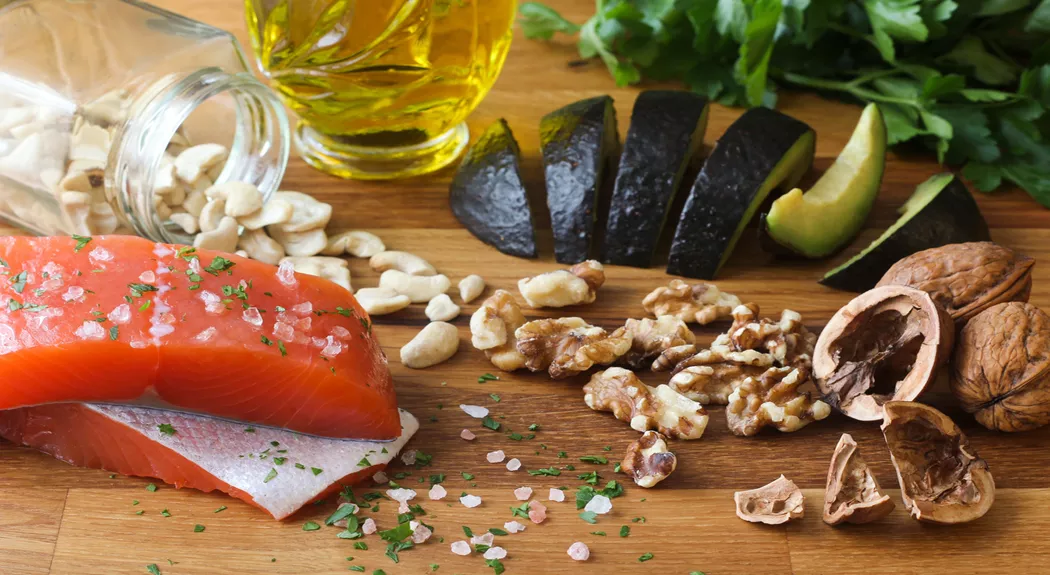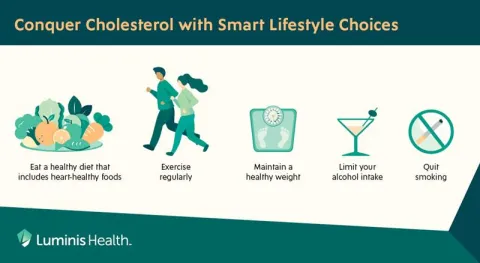
Salmon seasoned with salt, cashews, walnuts, sliced avocado, and olive oil on a butcher block, garnished with parsley.
Heart disease is the number one killer in the U.S., and it doesn’t discriminate. While it tends to affect men earlier, it affects both genders. The good news is many cases of stroke and heart attacks are preventable through lifestyle changes. Research suggests following a Mediterranean diet has many benefits. It can aid weight loss, blood sugar control, help with depression and reduce levels of inflammation, which is a risk factor for heart attack, stroke and Alzheimer’s.
A Mediterranean meal pattern is packed with fruits, vegetables, whole grains, legumes and olive oil. It highlights fish and poultry over red meat which is high in saturated fats. And red wine is consumed regularly but in moderation.
Here are a few top Mediterranean heart-healthy foods and tips
- Replace butter and margarine with olive oil. Olive oil is rich in monounsaturated fats along with canola and walnut oil, also high in omega 3 fatty acids. Try mixing with flavored vinegars for salad dressings, or marinades.
- Switch up your protein. Swap out red meat with fish, poultry, turkey, beans, nuts, soy and other plant-based proteins. Try one new recipe a week. ‘Tis the season for dusting off the crockpot.
- Enjoy fruit for dessert. A good source of fiber and antioxidants, fruit is a healthy way to indulge your sweet tooth. Try a new exotic fruit every week. Put fruits in recipes and keep it at the forefront in the kitchen and refrigerator.
- Set aside time to savor every bite. A Mediterranean diet is as much about lifestyle as it is diet. Instead of gobbling up your food in front of the TV or other media, sit down at a table and enjoy the food and the company. Eating slowly allows you to be more mindful on feelings of hunger and fullness.
- Dip it! Try vegetables with Mediterranean-inspired spreads such as hummus, tzatziki (creamy cucumber yogurt dip) or baba ghanoush (made from eggplant and sesame).
A sample meal plan may look like this
Breakfast: oatmeal with shaved almonds and an apple
Lunch: whole grain sandwich with vegetables.
Dinner: 3oz Broiled salmon, 1/3 c rice and 2 cups of cooked vegetables.
A good first step to eat Mediterranean is to incorporate at least one new plant-based recipe per week. Keep in mind that exercise, stress reduction and keeping socially connected are all part of the Mediterranean lifestyle for good health and happiness.
Ingredients:
1 large eggplant
1 clove garlic, crushed
2 Tbls. lemon juice
2 Tbls. tahini (sesame paste)
¼ c. parsley, chopped (may use basil or cilantro for different flavor)
Optional ¼ tsp. salt
Directions:
Preheat oven to 450 degrees.
Line a cookie sheet with foil. Prick eggplant with fork and place on cookie sheet.
Bake eggplant until soft – about 20-25 minutes.
Let the eggplant cool – cut lengthwise, drain off liquid and scoop out pulp into food processor. Process until smooth and transfer to bowl.
Stir in crushed garlic, lemon juice, tahini and parsley. Season with salt to taste.
Serve with fresh vegetables and enjoy!
By Ann Caldwell and Maureen Shackelford, nutritionists and registered dietitians at Anne Arundel Medical Center. To reach them, call 443-481-5555.



